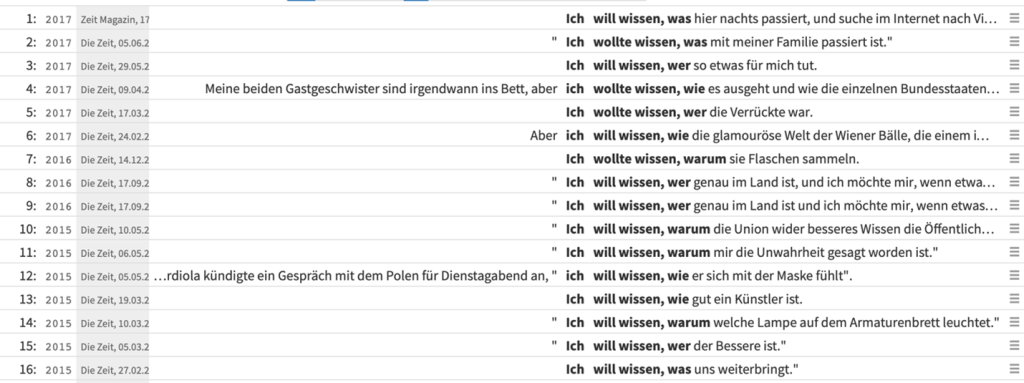Connectors 4: Question Words
In the module Connectors 1, you learned about different types of connectors of clauses: coordinating and subordinating conjunctions as well as adverbs. In this module, you will learn about one specific type of connectors: question words. They are used to form indirect questions to ask for information in a more polite way than with direct questions. Many indirect questions consist of a main clause such as Ich möchte wissen…, Weißt du…, Ich frage mich…, Ich weiß nicht…, Kannst du mir sagen… and of another clause connected to the main clause with a question word such as wer, wo, was, wann, wie.
Activity 1
First, let’s review the meaning of some frequent German question words by matching them with their English equivalents. If needed, you can consult the online dictionary LEO.
Choose the correct translation.
Activity 2
Now, let’s explore examples with these question words using Das Digitale Wörterbuch der Deutschen Sprache (DWDS), a large electronic collection of German texts known as a corpus. Below you will see two images that show example sentences. They are presented in form of a concordance – stacked lines of examples with the search words bolded and centered. If you find the text hard to read, you can go directly to the DWDS Corpus using the links provided below the images.
Read corpus examples below. Each example sentence starts with a main clause: Ich will / wollte wissen (a) or Weißt du (b). Pay special attention to the position of the conjugated verb in the second clause.
A.

B.

Which rules best describe the examples in (a) and (b)?
Activity 3
A.
It is important to correctly identify conjugated verbs in German sentences, which can be expressed through main verbs, auxiliary verbs (haben, sein, werden), or modal verbs (dürfen, mögen, müssen, sollen, wollen). Select the conjugated verb of the clause with the bolded question word in the following sentences from the DWDS corpus:
B.
Look at more DWDS examples with indirect questions below and change them to direct questions.
C.
Now, bring together what you learned and choose the correct rule for creating direct and indirect questions.
Activity 4
A.
When should you use a question mark in indirect questions and when not? Read the DWDS examples below and choose the correct punctuation mark at the end.
B.
Now, choose the correct statement:
Activity 5
Most question words in German start with a “w”. However, the subordinating conjunction ob is also a question word. Read the indirect question examples below and decide what type of questions usually use the conjunction ob.
- Weißt du, ob er noch lebt?
Werfel, Franz: Die Vierzig Tage des Musa Dagh II, Stockholm: Bermann – Fischer 1947 [1933], S. 85 - »Und was weißt du, ob ich arbeite oder nicht?
Schaeffer, Albrecht: Helianth II, Bonn: Weidle 1995 [1920], S. 59 - Ich möchte wissen, ob er damals schon begonnen hat mich zu lieben.
Rinser, Luise: Mitte des Lebens, Frankfurt a. M.: S. Fischer 1952 [1950], S. 38 - Aber weißt du, ob ich schnell genug aus dem Lager ‘rauskomme, wenn’s soweit ist?
Apitz, Bruno: Nackt unter Wölfen, Reinbek bei Hamburg: Rowohlt 1961 [1958], S. 97 - Ich möchte wissen, ob die Leute hier das wirklich Frühstück nennen.
Traven, B.: Das Totenschiff, Berlin: Büchergilde Gutenberg 1929 [1926], S. 19 - Ich will wissen, ob Sie an dem Unfall schuld waren.
Arjouni, Jakob: Happy birthday, Türke!, Zürich: Diogenes 1987 [1985], S. 123
Activity 6
On your own. Write 4 sentences with indirect questions, where you use at least 4 of the connectors mentioned in this module.
For example:
Kannst du mir sagen, wann der Zug ankommt?
Weißt du, ob es heute regnet?
Ich weiß nicht, wo wir essen sollen.
Schirin Kourehpaz & Nina Vyatkina

